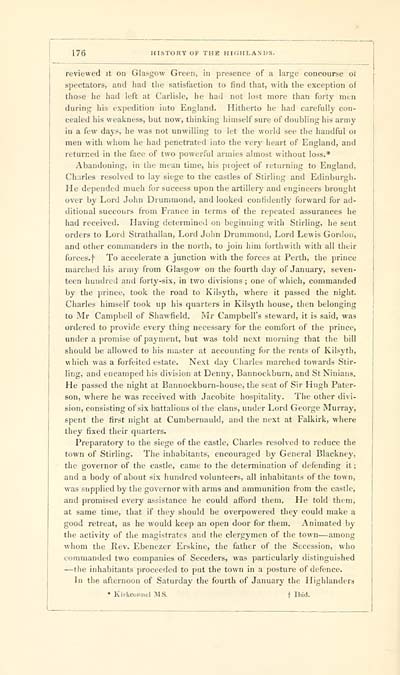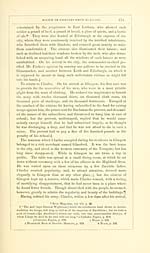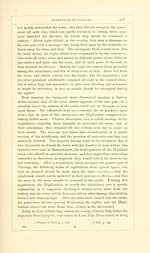Download files
Complete book:
Individual page:
Thumbnail gallery: Grid view | List view

176 HISTORY OF THE HIGHLANDS.
reviewed it on Glasgow Green, in presence of a large concourse oi
spectators, and had the satisfaction to find that, with the exception of
those lie had left at Carlisle, he had not lost more than forty men
during his expedition into England. Hitherto he had carefully con-
cealed his weakness, but now, thinking himself sure of doubling his army
in a few days, he was not unwilling to let the world see the handful oi
men with whom he had penetrateil into the very heart of England, and
returned in the face of two powerful armies almost without loss.*
Abandoning, in the mean time, his project of returning to England,
Chiirles resolved to lay siege to the castles of Stirling and Edinbui'gh.
He depended much for success upon the artillery and engineers brought
over by Lord John Drunimond, and looked confidently forward for ad-
ditional succours from France in terms of the repeated assurances he
had received. Having determined on beginning with Stirling, he sent
orders to Lord Strathallan, Lord John Drummond, Lord Lewis Gordon,
and other commanders in the north, to join liim lortliwith with all their
forces.f To accelerate a junction with the forces at Perth, the prince
marched his army from Glasgow on the fourth day of January, seven-
teen hundred and forty-six, in two divisions ; one of which, commanded
by the prince, took the road to Kilsyth, where it passed the night.
Charles himself took up his quarters in Kilsyth house, then belonging
to Mr Campbell of Shawfield. Mr Campbell's steward, it is said, was
ordered to provide every thing necessary for the comfort of the prince,
under a promise of payment, but was told next morning that the bill
should be allowed to his master at accounting for the rents of Kilsyth,
w hich was a forfeited estate. Next day Charles marched towards Stir-
ling, and encamped his division at Denny, Bannockburn, and St Niniaiis.
He passed the night at Bannockburn-house, the seat of Sir Hugh Pater-
son, where he was received with Jacobite hospitality. The other divi-
sion, consisting of six battalions ot the clans, under Lord George Murray,
spent the first night at Cundjernauld, and the next at Falkirk, where
they fixed their quarters.
Preparatory to the siege of the castle, Charles resolved to reduce the
town of Stirling. The inhabitants, encouraged b^' General Blackney,
the governor of the castle, came to the determination of defending it ;
and a body of about six hundred volunteers, all inhabitants of the town,
was supplied by the governor with arms and ammunition from the castle,
and promised every assistance he could afford them. He told them,
at same time, that if they should be overpowered they could make a
good retreat, as he would keep an open door for them. Animated by
the activity of the magistrates and the clergymen of the town — among
whom the Rev. Ebenezer Erskine, the father of the Secession, who
commanded two companies of Seceders, was particularly distinguished
— the inhabitants proceeded to put the town in a posture of defence.
Ill the afternoon of Saturday the fourth of January the Highlanders
• Kirkcunnel MS. t Ihid-
reviewed it on Glasgow Green, in presence of a large concourse oi
spectators, and had the satisfaction to find that, with the exception of
those lie had left at Carlisle, he had not lost more than forty men
during his expedition into England. Hitherto he had carefully con-
cealed his weakness, but now, thinking himself sure of doubling his army
in a few days, he was not unwilling to let the world see the handful oi
men with whom he had penetrateil into the very heart of England, and
returned in the face of two powerful armies almost without loss.*
Abandoning, in the mean time, his project of returning to England,
Chiirles resolved to lay siege to the castles of Stirling and Edinbui'gh.
He depended much for success upon the artillery and engineers brought
over by Lord John Drunimond, and looked confidently forward for ad-
ditional succours from France in terms of the repeated assurances he
had received. Having determined on beginning with Stirling, he sent
orders to Lord Strathallan, Lord John Drummond, Lord Lewis Gordon,
and other commanders in the north, to join liim lortliwith with all their
forces.f To accelerate a junction with the forces at Perth, the prince
marched his army from Glasgow on the fourth day of January, seven-
teen hundred and forty-six, in two divisions ; one of which, commanded
by the prince, took the road to Kilsyth, where it passed the night.
Charles himself took up his quarters in Kilsyth house, then belonging
to Mr Campbell of Shawfield. Mr Campbell's steward, it is said, was
ordered to provide every thing necessary for the comfort of the prince,
under a promise of payment, but was told next morning that the bill
should be allowed to his master at accounting for the rents of Kilsyth,
w hich was a forfeited estate. Next day Charles marched towards Stir-
ling, and encamped his division at Denny, Bannockburn, and St Niniaiis.
He passed the night at Bannockburn-house, the seat of Sir Hugh Pater-
son, where he was received with Jacobite hospitality. The other divi-
sion, consisting of six battalions ot the clans, under Lord George Murray,
spent the first night at Cundjernauld, and the next at Falkirk, where
they fixed their quarters.
Preparatory to the siege of the castle, Charles resolved to reduce the
town of Stirling. The inhabitants, encouraged b^' General Blackney,
the governor of the castle, came to the determination of defending it ;
and a body of about six hundred volunteers, all inhabitants of the town,
was supplied by the governor with arms and ammunition from the castle,
and promised every assistance he could afford them. He told them,
at same time, that if they should be overpowered they could make a
good retreat, as he would keep an open door for them. Animated by
the activity of the magistrates and the clergymen of the town — among
whom the Rev. Ebenezer Erskine, the father of the Secession, who
commanded two companies of Seceders, was particularly distinguished
— the inhabitants proceeded to put the town in a posture of defence.
Ill the afternoon of Saturday the fourth of January the Highlanders
• Kirkcunnel MS. t Ihid-
Set display mode to: Large image | Transcription
Images and transcriptions on this page, including medium image downloads, may be used under the Creative Commons Attribution 4.0 International Licence unless otherwise stated. ![]()
| Early Gaelic Book Collections > Ossian Collection > History of the Highlands and of the Highland clans > Volume 3 > (206) |
|---|
| Permanent URL | https://digital.nls.uk/79654894 |
|---|
| Description | Vol. III. |
|---|---|
| Shelfmark | Oss.249 |
| Attribution and copyright: |
|
| Description | Selected books from the Ossian Collection of 327 volumes, originally assembled by J. Norman Methven of Perth. Different editions and translations of James MacPherson's epic poem 'Ossian', some with a map of the 'Kingdom of Connor'. Also secondary material relating to Ossianic poetry and the Ossian controversy. |
|---|
| Description | Selected items from five 'Special and Named Printed Collections'. Includes books in Gaelic and other Celtic languages, works about the Gaels, their languages, literature, culture and history. |
|---|

